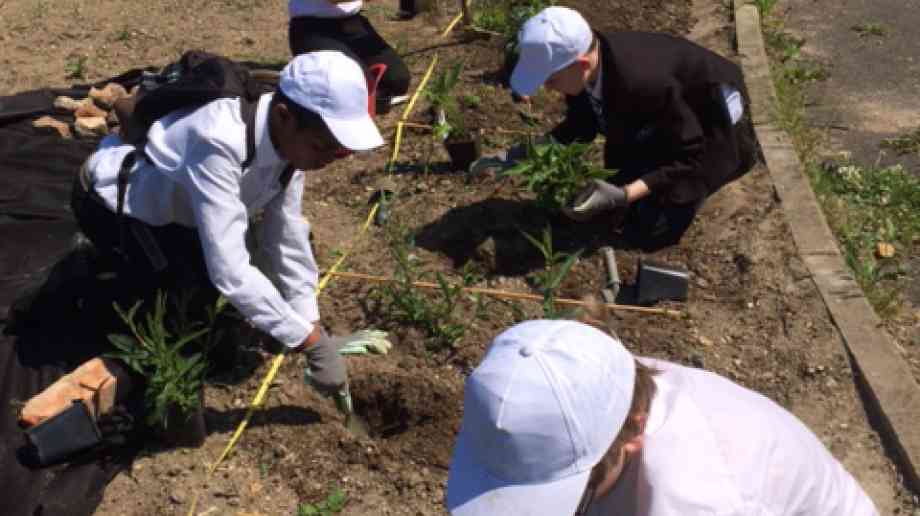
Pupil and pollinator-friendly school grounds
As children spend so much time in their school grounds every day, it is hugely important that these spaces are designed for both children and nature. Mary Jackson, projects manager at Learning through Landscapes, shares some ideas.
School grounds matter to children and research tells us that they can have a significant impact on mental and physical health as well as how children learn.
Daily contact with nature has also been shown to have a positive impact on wellbeing and, as school grounds are the places where most children spend time every day, it is hugely important that these spaces are designed for both children and nature.
Learning through Landscapes (LTL) is a UK-wide charity that supports schools in making the most of their grounds for learning, play and enabling children to get close to nature.
Over the last three years we have run Polli: Nation, a project with for 28,000 pupils aged 4 to 19 from 260 schools.
Whilst the project has focused on improving school grounds for pollinating insects, the changes are also helping other wildlife to thrive.
The UK-wide project has seen thousands of pupils undertake scientific surveys – discovering which insects are present in or visit their school grounds.
Pupils have learnt why pollinating insects are so important including to our food security and what changes can be made to school grounds to provide suitable habitats and food sources.
And it’s not just bees that pollinate our plants – butterflies, moths, beetles and flies are all vitally important.
A haven of wildlife
With the planting of fruit and vegetables and other flowering plants helping to extend the flowering season, the participating schools are now havens for wildlife.
Many feature bug hotels and new areas of meadow – some made by simply changing the mowing regime.
Other schools can learn from Polli: Nation and make big or small changes too. A pot of pollinator-friendly plants on an asphalt playground and an orchard of apple trees will both bring pollinating insects to school grounds. Where there are insects, birds and mammals will soon follow.
St Alban’s Church of England (Aided) Primary School in Havant, Hampshire has embraced the potential of the Polli: Nation project. Pupils at the school have created the ‘Pollinator promise’ a commitment that everyone can make to develop a 1m square patch of land for pollinators.
As Isabella, age 11, said: “Pollinators are very important for our environment and the state of the world. Polli: Nation gives people the chance to make a difference. Both people and pollinators need more colour in the world.”
More than three hundred signatories have already made the commitment, including the school’s MP.
You can sign up at: www.opalexplorenature.org/polli-promise and help pollinating insects in your schools’ grounds.
Polli: Nation concludes this year but the changes made to school grounds will have an impact on pollinators and pupils for years to come.
Grounds developed with nature in mind become greener spaces for children and young people to spend time in. They provide enhanced opportunities for play, for learning and the potential for experiencing the natural world. As a result, pupils become more active and there is a positive impact on their mental health.
A nature friendly school
However, you don’t have to have participated in Polli: Nation to become a nature friendly school – a school that not only encourages wildlife into its grounds but ensures that its spaces are used by pupils for play, learning and just being.
Visit the Polli: Nation website at www.polii-nation.co.uk to learn how to undertake the survey yourselves and make those all important links to the curriculum.
If you would like to develop and use your grounds in other ways, LTL can help. Our on-line resources provide a good starting point while the Learn and Play Out toolkit helps schools keen to make physical changes to their sites. We can also visit your school and run training for your staff. Our Local Schools Nature Grant programme (www.ltl.org.uk/naturegrants) provides successful schools with free training and resources for their grounds.
Busting myths
We can also help you bust some myths about your grounds – here are just a few answers to concerns we know many teachers have.
Do teachers need a special qualification to teach a class outside?
As a teacher you are qualified to teach your class inside and outside your classroom – after all, if you are a primary teacher, don’t you already teach PE outside?
If you are not confident in taking your class outside, see if you can team teach with someone who is.
You don’t have to take everyone out for all of the lesson either, start small and take a group, or the whole class, out for a short time, with a specific goal so that pupils have a task to focus on when they are outdoors.
What about the curriculum?
Research has shown that academic performance can improve when teaching takes place outdoors and that pupils gain skills in transferring that knowledge to real life situations.
In fact it has been shown that regular classes in outdoor settings can promote students’ learning.
Practical learning may take a bit longer but often that learning sticks better so it doesn’t need repeating as often.
Learning outdoors is generally very practical and hands-on – and many pupils respond well to this approach.
Some teachers wonder if they need to do a risk assessment every time they take pupils outdoors.
Once you have assessed your school grounds, unless you are doing something unusual or with a particular element of risk, you don’t need to repeat this every time you go outside.
However, you should review this every year, just as you would all other school policies.
We recommend a risk-benefit approach rather than a risk assessment.
This means looking at the benefits as well as the risks and balancing them against each other.
An activity with greater benefits might just be worth increasing the risk level slightly.
After all, the most dangerous activity in a school day is likely to be the journey to and from school and that is a risk that families believe is worth taking as the benefits are so great.
The control element
Some teachers fear that their class will behave badly outside, they won’t be able to control them and they won’t get any real work done.
Often pupils who struggle and who may be your troublemakers indoors are the ones that excel outdoors.
Outdoors, different skills come to the fore, so pupils which struggle to shine in a classroom may well suddenly be the ones solving the problems outside.
Set firm ground rules about where pupils can go and when they need to return to you and make sure you have some extra activities in hand. You may well discover that poor discipline isn’t the issue you expect it to be.
Take things one step at a time. Go outdoors for short activities rather than whole lessons to start with and build up as your pupils demonstrate that they can go outside sensibly and work well.
Polli: Nation is a Heritage Lottery Funded project and is a finalist in the National Lottery Awards 2018. If you think that children and young people should have access to nature everyday please vote for Polli: Nation at www.lotterygoodcauses.org.uk/awards/environmental
Further Information:Latest News
03/03/2026 - 09:57
The Scottish Government is rolling out a National Primary School Swimming Framework, a universal offer to primary aged children to learn to swim alongside learning vital water safety skills.
03/03/2026 - 09:37
Senior HM Inspector Adam Sproston will discuss the inspectorate’s approach to SEND and inclusion at Education Business LIVE in March.
02/03/2026 - 10:07
Children’s charity Youth Sport Trust has awarded the first Well School accreditations, recognising schools that are prioritising pupil and staff wellbeing alongside academic performance as a measure of success.
02/03/2026 - 09:39
The government has launched a major new consultation to gain views on how to keep children safe online across social media, AI chatbots and gaming platforms.
27/02/2026 - 14:12
LGfL-The National Grid for Learning has launched a free Artificial Intelligence (AI) Policy Toolkit to help schools across the UK develop clear approaches to AI that put safeguarding at the forefront.







